Lorraine, from Australia, is a breast cancer patient. After her diagnosis, the rapid progression and severity of her condition left local doctors at a loss. However, after undergoing integrated minimally invasive treatment at Guangzhou Modern Cancer Hospital, her condition improved steadily.
A Turning Point in Fate: An Accident Leads to a Breast Cancer Diagnosis
In June 2024, Lorraine had an accident. While the accident was unfortunate, the subsequent medical examinations revealed a hidden life-threatening condition—breast cancer.
"During a routine check-up after the accident, a small lump was discovered in my left breast. At the time, the doctor assured me that everything was fine and not to worry, prescribing antibiotics for symptomatic treatment. However, over the next three months of follow-up visits, I noticed the lump kept growing. At the hospital in Perth, I underwent various tests, including PET scans, CT scans, and biopsies. But it wasn’t until the end of the year that I received a definitive diagnosis—squamous cell carcinoma of the left breast. At the same time, I was told my life was nearing its end. Due to the advanced stage of the disease, they could only offer palliative care."
This outcome left Lorraine feeling devastated, but she refused to give up. She and her family began searching online, hoping to find more advanced and effective innovative treatments. Among the search results, cryotherapy and Guangzhou Modern Cancer Hospital caught their attention, leading to an online consultation.
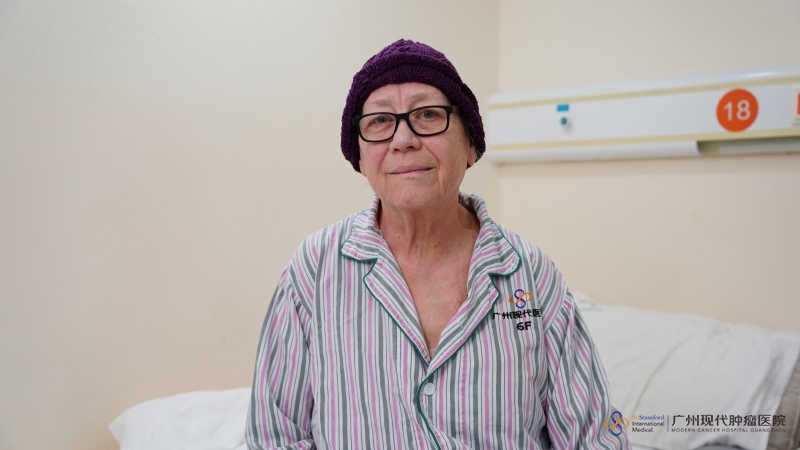
From Online Consultation to In-Person Meeting: A Life-Saving Journey Across Hemispheres
Separated by hemispheres and thousands of miles, nothing could deter a heart filled with hope for life. Lorraine began consulting with doctors at Modern Cancer Hospital Guangzhou via email. From learning about the treatments offered to understanding which specific therapies could address her condition; from sending medical reports to receiving a tailored treatment plan; from initial apprehension to finally making the decision to proceed—throughout this online consultation, Guangzhou Modern Cancer Hospital earned Lorraine’s trust with its advanced, professional, and reliable approach.
"I can’t pinpoint exactly what convinced me to come to Guangzhou. I think my confidence came from the entire consultation process. After sending my medical reports, the doctors’ reliability, competence, and dedication left a strong impression on me. I also compared treatments from other hospitals, but the minimally invasive therapies like interventional and particle treatments at Guangzhou Modern Cancer Hospital stood out for their advanced and unique approach."
On February 14, 2025, after a long flight, Lorraine arrived at Guangzhou Modern Cancer Hospital, accompanied by her family.
Shocking Condition vs. Breakthrough in Minimally Invasive Treatment
Lorraine’s condition was characterized by a slow onset but rapid progression. Before admission, the massive tumor caused significant disruption to her daily life, eventually ulcerating and bleeding. As her hemoglobin levels continued to drop, she frequently required blood transfusions in Australia. The cancer had taken such a toll that by the time she was admitted, Lorraine had lost 30 kg in three months, and the tumor measured 144x84x145 mm. The medical records described it as a "large, cauliflower-like mass on the left breast, ulcerated and bleeding." The reality was nothing short of shocking.
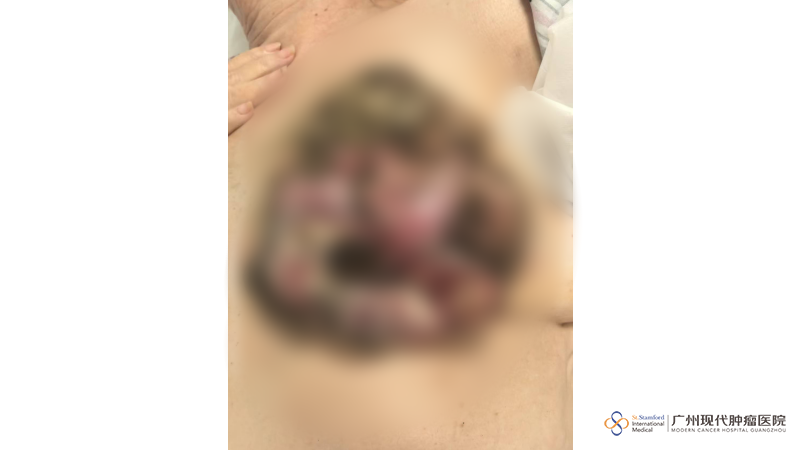
[Before treatment]
Admission tests confirmed Lorraine’s pathological stage: squamous cell carcinoma of the breast (T4N2M1).
"I knew my condition was serious, and I didn’t expect much in terms of treatment options. But the doctors had already prepared a treatment plan for me. At the time, I had issues with my kidneys and heart, so the doctors first addressed these underlying problems before starting the anti-cancer therapy."
Given the complexity of Lorraine’s condition, the MDT developed an integrated minimally invasive treatment plan centered on vascular interventional therapy. The primary goal was to shrink the massive tumor. Vascular interventional therapy involves making a 1-2 mm incision to deliver high-concentration drugs directly into the tumor’s blood vessels and embolize the tumor and its feeding arteries. Local perfusion achieves drug concentrations 2-92 times higher than intravenous infusion. Embolization therapy "blocks" the blood supply to the tumor, starving it, while the embolic agents slowly release anti-cancer drugs, playing a crucial role in tumor treatment.
On February 19 and March 12, Lorraine underwent two rounds of arterial infusion and embolization. After these treatments, her tumor shrank by approximately 60%.
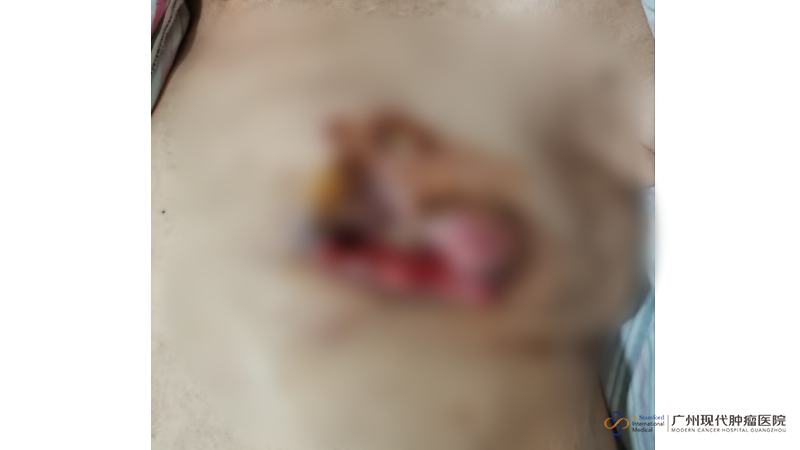
[Post-treatment wound]
On April 12, Lorraine was readmitted for a follow-up. The results showed significant improvement in her condition. Overjoyed, she declared: "Coming to Guangzhou Modern Cancer Hospital was my lucky!"
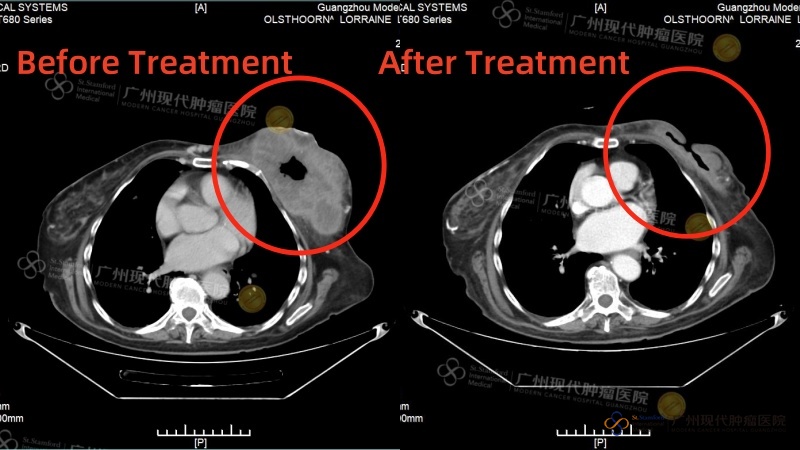
East Meets West in Healthcare: A Shift from Worry to Trust
Traveling from Australia to Asia, the long flight didn’t deter Lorraine in the slightest. This was her last resort. Her only concern was whether her condition was too advanced for any treatment, even in Guangzhou.
"My doctors in Australia advised against coming to Guangzhou, warning me that I might die here. Now, I’m so glad I persisted. Compared to the doctors in Australia, the doctors here clearly explained my condition, the treatment plan, and the expected outcomes. The nurses are also more careful, attentive, and well-trained."
Before treatment at Guangzhou Modern Cancer Hospital, Lorraine was physically weak, struggling to get up or walk, and her quality of life was poor. After treatment, she could walk on her own and perform many daily tasks. Reflecting on her journey, Lorraine noted that there had been subtle symptoms earlier, but she hadn’t paid attention. If diagnosed sooner, she might have been more independent now and not burdened her children. Still, she is grateful for the advanced treatment she received in Guangzhou. Hoping for continued improvement, she also wants to encourage other patients: "Find the right treatment and never give up hope!"
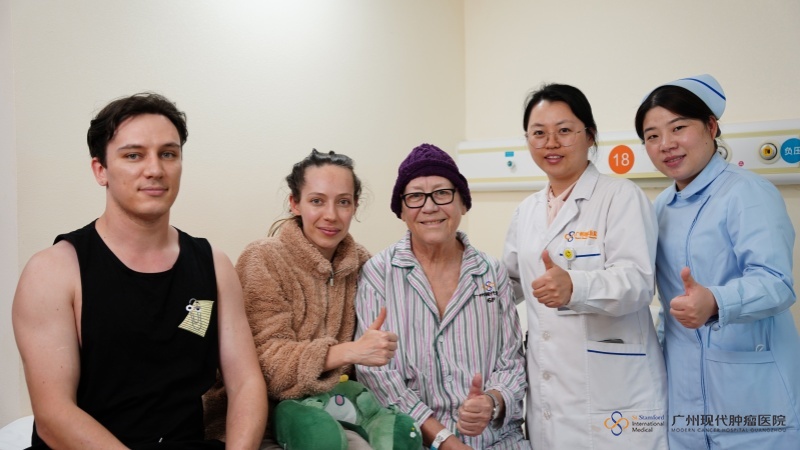
*Surgery, in addition to the appropriate chemotherapy and radiotherapy, are effective in treating early cancer, but certain patients in late stage of cancer may not be tolerate surgery well as they can be relatively weak. A combination of carefully planned minimally invasive therapy, chemotherapy or radiotherapy can effectively reduce the side effects and discomfort of treatment and may help patient get better efficacy.













 viber
viber